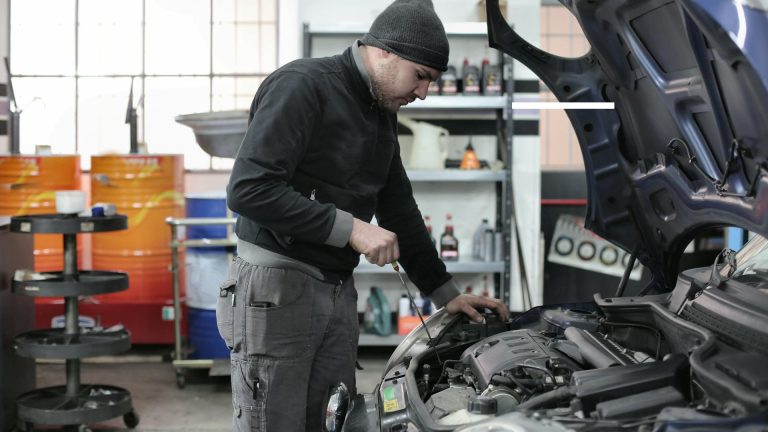Getting your car serviced regularly is crucial for keeping it running smoothly and safely on the road. But what exactly does a full car service entail? Many drivers aren’t entirely sure what’s included and checked during a comprehensive service.
In this article, we’ll take a detailed look at the various components and systems that are inspected and worked on during a full service at a reputable garage.
The UK’s FREE vehicle maintenance reminder service.
Road tax, MOT, insurance & maintenance alerts totally FREE.
Helping 1,000’s of UK drivers avoid penalties & stay legal on the road.
Engine Oil & Filter Change
One of the core parts of any car service is changing the engine oil and filter. Engine oil lubricates all the fast-moving components in your engine, reducing friction and wear. However, it picks up dirt, metal particles and sludge over time which reduces its effectiveness. Most manufacturers recommend an oil change every 12 months or 12,000 miles.
During the service, the old oil will be drained out and replaced with new oil that meets your car’s specifications. The oil filter, which catches any contaminants in the oil, will also be swapped for a new one. This simple but essential maintenance helps ensure maximum engine life.
Air Filter Replacement
Another filter that should be replaced is the engine air filter. This component prevents abrasive particles from entering the engine intake and causing premature wear on cylinders, pistons and other parts. Most are designed to last 12-24 months before becoming too clogged to allow proper airflow.
Cooling System Inspection
Your car’s cooling system is crucial for preventing overheating. During a full service, the coolant level and concentration will be checked and topped up if required. The technician will also inspect all cooling system components like the water pump, thermostat, radiator and coolant hoses for any leaks or obvious signs of deterioration.
Brake Inspection
The brakes are obviously one of the most important safety systems on your vehicle. As part of the service, the brake fluid level will be checked and topped up using the correct specified fluid. The condition of the front and rear brake pads will also be thoroughly inspected to see if they need replacing soon due to wear.
While they’re at it, the garage will also check the condition of the brake discs/drums and inspect all brake lines and hoses for any potential leaks or damage. The handbrake mechanism and pedal operation will be tested too.
Steering, Suspension & Tyre Check
Proper steering and suspension operation is paramount for maintaining control and stability, especially during evasive manoeuvres. So the mechanic will analyse all steering components including the steering rack, tie rods and any rubber boots/gaiters. They’ll check for any play or untoward movement in the front suspension and inspect the rear setup too.
The condition and pressure of all tyres (including the spare) will also be examined during a comprehensive car service. The legal minimum tread depth is 1.6mm across the middle ¾ of the tyre, but your garage may recommend replacement at around 3mm for optimal wet grip. They’ll also check for any cuts, bulges or uneven wear that could point to suspension issues.
Exhaust Inspection
The vehicle’s exhaust system will get a thorough once-over too. Leaks can potentially allow dangerous fumes to enter the cabin, so any holes or loose joints will need repairing or replacing as needed. Excessive rust or rattling could also indicate it’s time for a new exhaust system.
Lights, Wipers & More
Often overlooked items like lights, wipers, mirrors and washers will all be checked during the service to make sure they’re operating as they should. For example, all interior and exterior bulbs will be tested and any duds swapped out. The wiper blades will be inspected for any tears or signs of deterioration that could hamper their clearing ability.
Other miscellaneous items like fluid levels, drive belts, battery condition and general underneath inspection will also form part of a comprehensive service. The technicians will jot down any issues found and provide quotes for any recommended repair work required to get your car back into optimal mechanical health.
Additional Checks
Depending on the garage, your car’s age and mileage, there may be some additional checks and maintenance items included during a full service. For example, many workshops will recommend changing brake fluid, spark plugs and air conditioning refrigerant during a major service for higher mileage cars to help extend their lifespan.
There could also be manufacturer-specified maintenance items unique to your vehicle’s make and model. Referring to your owner’s manual and speaking to the service centre about exactly what’s included for your particular car is highly recommended.
The Bottom Line
As you can see, a full comprehensive car service covers a wide range of items all designed to keep your vehicle operating at its best for years to come. From filter replacements and fluid changes to thorough system inspections, a good service is an essential part of preserving your car’s health, performance and safety on the roads.
Don’t overlook this crucial maintenance – stay on top of your manufacturer’s service schedule recommendations. It may seem like an inconvenient cost, but it will likely save you money compared to major repair bills down the line caused by lack of care. Take your car to a reputable, professional garage that follows proper service checklists. Your car will thank you for it!

